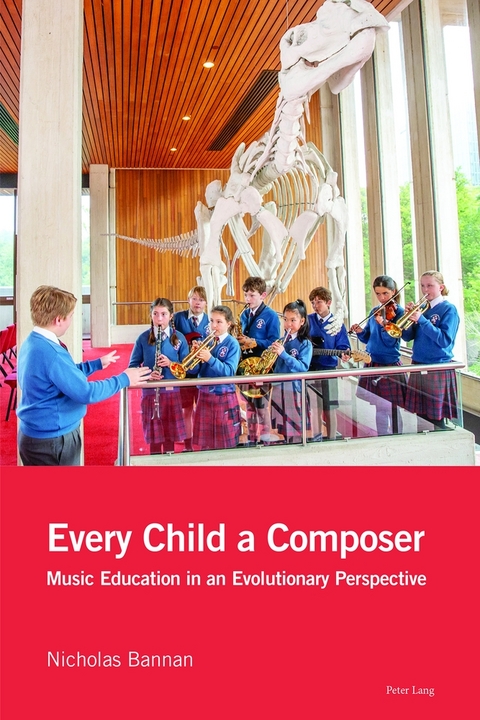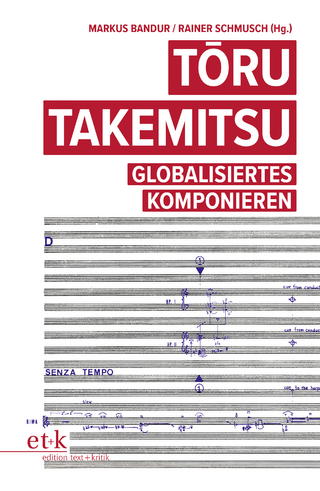
Every Child a Composer
Peter Lang International Academic Publishers (Verlag)
978-1-78874-083-8 (ISBN)
This book breaks new ground in drawing on evolutionary psychology in support of advocacy for music education, and the presentation of innovative musical pedagogy. The book adopts the perspective that musical experience is the birthright of all human beings through the decisive role it played in the evolution of our species, the traces of which we carry in our genes. The author draws on scientific developments in acoustics, neuroscience, linguistics, archaeology and anthropology to examine theories that have emerged powerfully during the last twenty years and which argue for the significance of the practice of music as foundational to human culture. This position is examined in parallel with research into how children learn musically, and the role that creative decision making plays in this. A series of strategies is presented that explores collective creativity which draws on vocalisation, the use of gesture, and instinctive responses to harmony to develop musical imagination.
Nicholas Bannan was a chorister at Canterbury Cathedral before studying at Cambridge University, focusing on composition. He has taught Music in several schools including Eton College, Desborough School in Maidenhead and the Yehudi Menuhin School; and in higher education at the London College of Music, Oxford Brookes University and the University of Reading, where he also completed his PhD on the evolutionary origins of the human singing voice. He won the Fribourg Festival Prize for Sacred Music in 1986, and his works have received performances from the Choir of St Paul’s Cathedral, La Chapelle Royale de Paris, the Guildhall String Ensemble, and the Allegri and Grieg string quartets. Since 2006, he has lectured in Music at the University of Western Australia, where he leads courses in music education and aural, directs The Winthrop Singers, and supervises masters and doctoral research.
CONTENTS: Evolutionary musicology and music education - Music, evolution and self-expression - The vocal basis of human musicality as an evolved phenomenon - Music education and creativity - Musical learning through collective creativity - Pedagogy for collective creativity: Introducing Harmony Signing - Harmony Signing: Commencing with monophonic work - The evolution of polyphony - The basis of Harmony Signing: Three-part voice-leading - Expanding the harmonic world: Journeys beyond the tonic horizon - A notation system for sketching Harmony Signing operations - Composing with the Primary Triads - Introducing inversions - Further exercises to develop security of location - Expanding the universe via modulation: Excursions to replacement keys - New chords within the Tonic: The Secondary Triads of the major scale - Free(r) composition: Moving beyond homophony - Minor mode signing - New short-cuts to modulation, and new destinations - The Pandora’s box of chromaticism: The diminished triads and other «portkeys»; modal variants and 12-note music - More on 7ths and their implications, 9th chords, and enharmonic relationships - Harmony Signing in four (or more) parts - Creative Harmony Signing in group composition and improvisation - The limits of Harmony Signing: What students suggest, and some further directions to explore - Teaching Composition at Secondary School - Creative pedagogy in practice - Developing compositional strategies - «What if ?» analysis: Creative engagement with existing music - Developing an integrated music curriculum that fully embraces creativity.
| Erscheinungsdatum | 10.12.2018 |
|---|---|
| Zusatzinfo | 260 Illustrations |
| Verlagsort | Oxford |
| Sprache | englisch |
| Maße | 150 x 225 mm |
| Gewicht | 905 g |
| Themenwelt | Kunst / Musik / Theater ► Musik ► Musiktheorie / Musiklehre |
| Sozialwissenschaften ► Pädagogik | |
| ISBN-10 | 1-78874-083-1 / 1788740831 |
| ISBN-13 | 978-1-78874-083-8 / 9781788740838 |
| Zustand | Neuware |
| Informationen gemäß Produktsicherheitsverordnung (GPSR) | |
| Haben Sie eine Frage zum Produkt? |
aus dem Bereich


